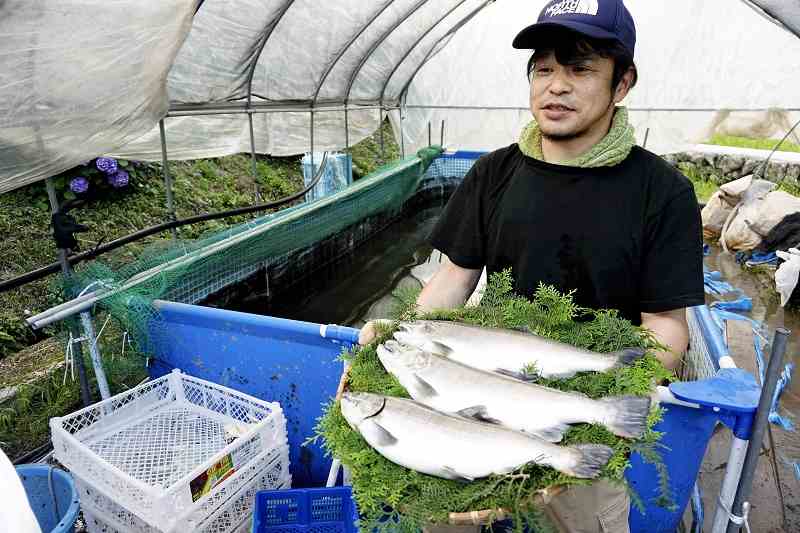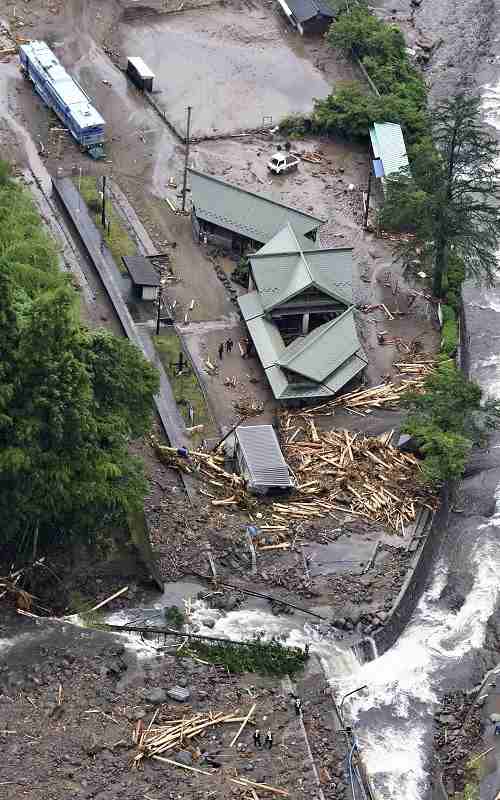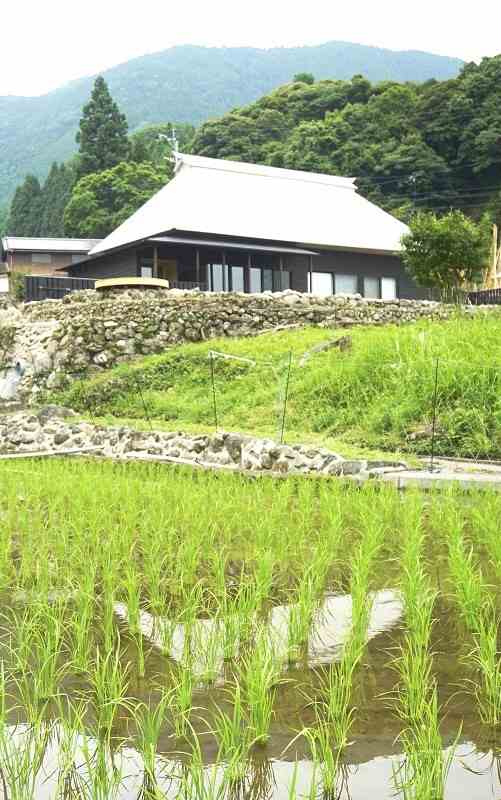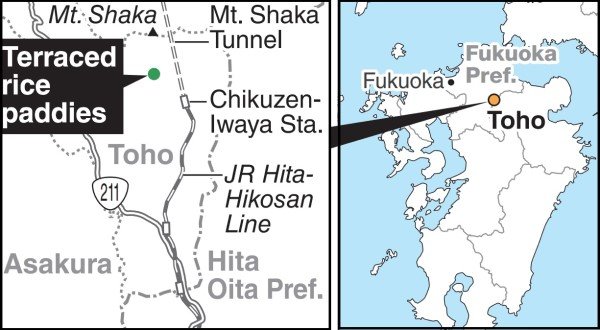
Hironobu Kajiwara shows the village’s first farmed yamame trout on June 23 in Toho, Fukuoka Prefecture.
23:00 JST, July 24, 2021

Chikuzen Iwaya Station is seen in July 2017 after the tracks were washed away and fallen trees were swept onto the premises.
TOHO, Fukuoka — Residents of a village hit hard by severe rainfall four years ago have started to farm yamame trout using natural spring water in a bid to help their hometown survive.
The water, named Iwaya Natural Spring Water, was discovered in 1939 during the construction of the Mt. Shaka Tunnel in Toho, Fukuoka Prefecture. The spring yields about 15,000 tons of water per day. In 2008, the Environment Ministry recognized it as one of the 100 best water sources of the Heisei era.
The water is sold for ¥100 per 30 liters at a dispenser in front of Chikuzen-Iwaya Station on the JR Hita-Hikosan Line. A total of 45,500 people used it in fiscal 2016.
However, the village was devastated by a heavy rain disaster in July 2017. Three villagers were killed and the Hita-Hikosan Line was partially disrupted. As a result, the use of the water dispenser also decreased, with the number of annual users dropping to below 20,000 through fiscal 2017-20.
Hironobu Kajiwara, a farmer in the village, felt a sense of crisis and sought to utilize the spring water with his friends, and came up with the idea of fish farming.
“I thought my hometown was going to die,” Kajiwara said.
Kajiwara consulted the prefectural fisheries laboratory in Asakura, next to the village, and found that the spring water, with its constant temperature of 17 C and rich oxygen content, was suitable for yamame trout farming. Using the help of a prefectural subsidy, he set up a tank and plumbing equipment.
Kajiwara and three friends started yamame farming in October last year after they were provided by the laboratory with about 200 young fish about 10 centimeters in length.
All four of them had never farmed fish before. So at first, they ran into trouble in feeding the trout, because the fish were wary and didn’t eat what they were given.
The laboratory — the Freshwater Fisheries Laboratory of the Fukuoka Fisheries and Marine Technology Research Center — advised them on feeding methods. After that when they fed the fish, they threw the food in without being seen. As a result, the amount of leftover food decreased.
In June of this year, they scooped up 150 trout from the tank, as the fish had grown to about 50 centimeters long. Currently, the four are now preparing for the production and sale of canned yamame trout.
On July 5, they purchased about 1,000 fry for the next stage of aquaculture. A new school of trout is now swimming vigorously in a tank placed in a terraced rice field near Chikuzen-Iwaya Station.
“I never expected the fish to grow so well. It’s like magic water,” said Kajiwara.
“The Iwaya Natural Spring Water creates almost the same conditions as a natural stream that yamame would live in,” said Teruaki Ito, a researcher at the laboratory. “I’m sure that this water will allow them to farm high-quality trout at a low cost.”
The Toho village municipality is focusing on the promotion of tourism in its reconstruction efforts.
Near Chikuzen-Iwaya Station, there are terraced rice fields built over 400 years ago that are one of the village’s tourism resources.

Villa Antage overllooks terraced rice fields.
The village hopes to offer the farmed fish at a new municipal accommodation facility, Villa Antage, which opened last July as a symbol of reconstruction. The facility, a renovated old house near the station, got off to a good start. Reservations have been pouring in despite the coronavirus crisis, because visitors are attracted by the spectacular view of the terraced rice paddies and the hospitality of the local people.
Kajiwara said, “I want to make the farmed yamame into a new specialty of our village, so that we can entertain tourists with the fish.”
The Hita-Hikosan Line, which has remained out of service, is expected to be restored in 2023 in the form of a bus rapid transit system, with buses running on dedicated roads and other routes, taking the place of the railway trains.
“I want to prepare for offering visitors boxed lunches and local dishes using yamame as ingredients,” Kajiwara said.

A map of the ‘Terraced rice paddies’ in Toho, Fukuoka Prefecture.
Top Articles in Society
-

Man Infected with Measles Reportedly Dined at Restaurant in Tokyo Station
-

Man Infected with Measles May Have Come in Contact with Many People in Tokyo, Went to Store, Restaurant Around When Symptoms Emerged
-

Woman with Measles Visited Hospital in Tokyo Multiple Times Before Being Diagnosed with Disease
-

Australian Woman Dies After Mishap on Ski Lift in Nagano Prefecture
-

Foreign Snowboarder in Serious Condition After Hanging in Midair from Chairlift in Nagano Prefecture
JN ACCESS RANKING
-

Japan PM Takaichi’s Cabinet Resigns en Masse
-

Japan Institute to Use Domestic Commercial Optical Lattice Clock to Set Japan Standard Time
-

Israeli Ambassador to Japan Speaks about Japan’s Role in the Reconstruction of Gaza
-

Man Infected with Measles Reportedly Dined at Restaurant in Tokyo Station
-

Videos Plagiarized, Reposted with False Subtitles Claiming ‘Ryukyu Belongs to China’; Anti-China False Information Also Posted in Japan




















